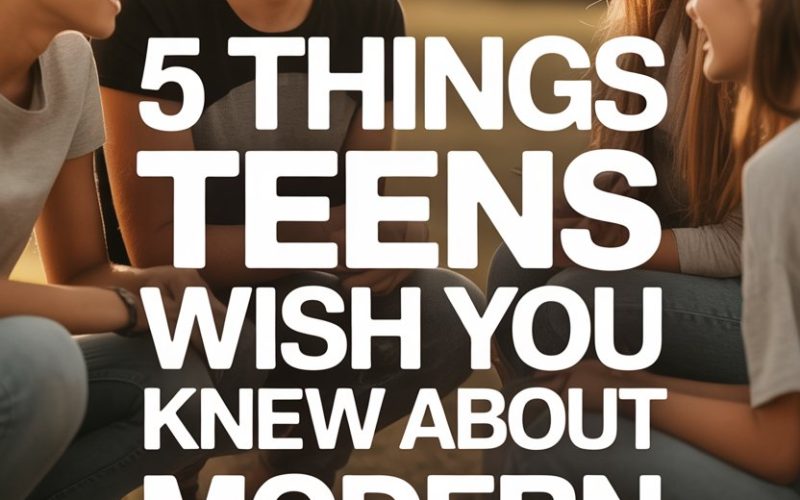Dating has come a long way since notes in lockers and awkward calls on the family landline.
For parents, this new world can feel like deciphering hieroglyphics—only the hieroglyphics have emojis and disappear after eight seconds.
But your teen? They’re living it, every day, and—believe it or not—they’d like you to understand a few things.
Here’s what teens wish you knew about modern romance, and how you can support them without accidentally texting their crush an embarrassing meme.
1. Dating Happens Online (Yes, Even for Teens)
If you imagine your child’s love life playing out at the school dance, it’s time to recalibrate. Messaging apps, social media, and even platforms like Discord have become the new hangouts.
Teens might chat for weeks, exchanging memes and inside jokes, before ever speaking in person.
It’s not just about texting, either. “Sliding into DMs” is a real thing, and entire crushes can blossom through stories and reactions, never mind an actual face-to-face encounter.
Pew Research Center found that nearly half of U.S. teens say they’ve at least flirted or chatted up a crush online.
For busy parents, the urge to panic is understandable. But before you ban every app, know this: online dating isn’t inherently dangerous or “less real.”
For many teens, the digital route feels safer and less intimidating than IRL (in real life) approaches. It gives them time to think—something all of us probably wish we’d had during our own blushing, tongue-tied adolescence.
What helps? Show curiosity, not condemnation.
Ask which platforms they like, what kinds of conversations make them laugh, and which emojis they think are totally cringe. (Spoiler: it’s probably the one you use most.)
And yes, a little friendly snooping is part of the job, but try to do it with their consent. Open conversations go much further than covert surveillance.
2. Labels Aren’t What They Used to Be
“Are you two dating?” used to be a simple question—now, it’s like asking someone to define quantum physics at the dinner table.
Dating in 2024 comes with a full menu of labels: talking, vibing, situationship, exclusive-but-not-official, and a dozen others that sound like rejected band names.
Teens often prefer ambiguity, and many avoid labels altogether.
Why? For one, there’s safety in vagueness. Social media means that every relationship status update is public knowledge, and no one wants to be meme-ified for being “too extra” about a new romance.
Plus, many teens are figuring out their identities, orientations, and what relationships even mean to them. The pressure to “define the relationship” can feel like being squeezed into skinny jeans two sizes too small.
Instead of grilling your teen about official titles, ask about their feelings.
“Do you like spending time with this person?” or “What do you enjoy about your friendship?” goes much further than an interrogation about Facebook statuses.
And if you catch yourself thinking, “Back in my day…”—stop right there. Your day didn’t feature Snapchat streaks or TikTok trends, and that’s perfectly okay.
You survived, and so will they.
3. Privacy is Sacred (But Safety Comes First)
Every teen wants privacy, especially when it comes to their love life. (Some parents reading this may still have PTSD from their own mum waving at their crush from the window.)
Modern teens, though, juggle privacy on two fronts: from parents and from their massive online audiences.
A teenager might be an open book with friends, but fiercely guard secrets from family. That doesn’t mean they’re up to no good—sometimes, it’s embarrassment, uncertainty, or just a desire to figure things out alone.
At the same time, digital privacy is a minefield. What feels private can go public in a tap.
Teens know this, but they’re not immune to mistakes—a screenshot, a forwarded message, and suddenly, a private conversation is everyone’s business.
The balance? Respect their need for space, but make clear that safety trumps secrecy.
Experts at Common Sense Media recommend regular, non-judgmental chats about boundaries, consent, and what’s okay to share online. Frame it as helping them keep control, not as a lack of trust.
Try: “I trust you, but I also know how quickly things can go sideways online. If anything ever makes you uncomfortable—even if you think I’ll be mad—I want you to come to me. No lecture, promise.”
You might get an eye roll. That’s practically a love letter, parent-to-teen.
4. Dating is More Inclusive Than Ever (And Still Confusing)
Gender, sexuality, pronouns—teens today navigate a world that’s more accepting, but also more complex, than ever before.
Friend groups are less likely to blink at someone coming out, or at a couple that doesn’t fit the “boy-girl” mold. For many, love is love, end of story.
But that doesn’t mean it’s easy. Teens may still struggle to share their identity at home, or worry about being misunderstood.
If you grew up with “gay” or “straight” as the only options, today’s vocabulary can feel like learning a new language while assembling IKEA furniture—no instructions, extra screws, and everyone’s a little confused.
Mistakes will happen. You’ll mess up someone’s pronouns, or ask a question that makes your teen groan loud enough to wake the neighbors.
The important thing? Keep trying. Listening matters more than getting it perfect.
GLSEN’s research notes that teens with supportive families are far less likely to experience depression or anxiety. Acceptance isn’t about having all the answers—it’s about showing up, even when you feel out of your depth.
If your teen comes out, or brings home a crush who breaks the “boy and girl” mold, your job is simple: love the kid you have, not the one you imagined in your head. The rest can be Googled.
5. Pressure Is Everywhere
Maybe you remember being nervous about asking someone to the dance. These days, the pressure is relentless—likes, streaks, snaps, DMs, group chats, “shipping” (that’s rooting for a couple, not Amazon Prime), and more.
Every interaction can be screenshotted, judged, and commented on by a peanut gallery of peers.
Then there’s the pressure to date at all.
Some teens want nothing to do with romance, but feel “weird” if they’re not paired up. Others might feel rushed into relationships before they’re ready, thanks to TikTok trends or viral “couple goals” content.
Add on the pressure to look a certain way—thanks, Instagram filters—and it’s no wonder so many teens feel anxious about dating.
What helps? Remind your teen that there’s no rush. Share stories from your own awkward years (the more tragic, the better).
Make it clear that their value isn’t tied to having a partner, or the number of likes on a cute couple selfie.
Encourage screen breaks, too. Suggest a movie night, a walk, or—if you’re brave—an old-fashioned board game. Anything to show that life exists beyond the glowing rectangle.
And if your teen wants to talk about drama, heartbreak, or the agony of being left on read? Put down the phone, make eye contact, and listen like it’s the most important thing in the world.
Because, for them, it is.
Keeping Up Without Losing Your Mind
Modern dating can feel like a foreign country where everyone speaks in abbreviations and nobody leaves voicemails.
Still, every parent wants the same thing: for their child to be safe, happy, and respected—whatever form their love life takes.
You won’t get it right every time. That’s okay. Your interest, your patience, and—yes—your willingness to hear about a “situationship” without laughing are what make the difference.
Keep the lines open, keep a sense of humor handy, and don’t be afraid to admit when you need help decoding the latest slang. If you’re reading this, you’re already one step ahead.
Now, go ask your teenager what “rizz” means… and brace yourself.




